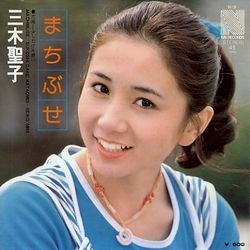Update @ July 7, 2025: If you are having issues with the site (including any PHP errors), please contact us via Facebook. Thank you!
Miki Seiko: Difference between revisions
From generasia
(Created page with 'right|300px|thumb|Miki Seiko on the cover of her first single [[Machibuse (Miki Seiko)|Machibuse (1976)]] '''Miki Seiko''' (三木聖子) was a…') |
No edit summary |
||
| (4 intermediate revisions by 3 users not shown) | |||
| Line 1: | Line 1: | ||
[[Image:Mikiseiko_machibuse.jpg|right| | [[Image:Mikiseiko_machibuse.jpg|right|250px|thumb|Miki Seiko on the cover of her first single "[[Machibuse (Miki Seiko)|Machibuse]]" (1976)]] | ||
'''Miki Seiko''' (三木聖子) | '''Miki Seiko''' (三木聖子) is a [[J-Pop|Japanese pop]] singer formerly under the agency [[Minayo Production]]. She got her start in the world of show business when she debuted as an actress in 1975 in the drama ''[[Akuma no You na Aitsu]]''. A year later, she started her music career with the single "[[Machibuse (Miki Seiko)|Machibuse]]", which was later covered and made famous by [[Ishikawa Hitomi]]. Shortly after the release of her album ''[[Seiko (Miki Seiko)|Seiko]]'', she retired from show business. | ||
== Profile == | == Profile == | ||
* '''Birthdate:''' {{bda|1957|12|12|mf=yes}} | |||
* '''Birthdate:''' | |||
* '''Birthplace:''' Fukuoka Prefecture | * '''Birthplace:''' Fukuoka Prefecture | ||
| Line 11: | Line 10: | ||
=== Albums === | === Albums === | ||
* [1976.12.10] [[Seiko (Miki Seiko)|Seiko]] (聖子) | * [1976.12.10] [[Seiko (Miki Seiko)|Seiko]] (聖子) | ||
* [2002.02.20] [[Miki Seiko Best|Miki Seiko BEST]] (三木聖子BEST) | * [2002.02.20] [[Miki Seiko Best|Miki Seiko BEST]] (三木聖子BEST) | ||
=== Singles === | === Singles === | ||
* [1976.06.25] [[Machibuse (Miki Seiko)|Machibuse]] (まちぶせ) | * [1976.06.25] [[Machibuse (Miki Seiko)|Machibuse]] (まちぶせ) | ||
* [1976.10.10] [[Koi no Stadium]] (恋のスタジアム) | * [1976.10.10] [[Koi no Stadium]] (恋のスタジアム) | ||
| Line 22: | Line 19: | ||
== Filmography == | == Filmography == | ||
* [1975] Akuma no You na Aitsu | * [1975] Akuma no You na Aitsu | ||
* [1976] Daitoukai Tatakai no Hibi | * [1976] Daitoukai Tatakai no Hibi | ||
| Line 29: | Line 25: | ||
== External Links == | == External Links == | ||
* [http://ja.wikipedia.org/wiki/%E4%B8%89%E6%9C%A8%E8%81%96%E5%AD%90 Japanese Wikipedia: 三木聖子] | * [http://ja.wikipedia.org/wiki/%E4%B8%89%E6%9C%A8%E8%81%96%E5%AD%90 Japanese Wikipedia: 三木聖子] | ||
[[Category: Artists]] | [[Category:Artists]] | ||
[[Category: J-Pop]] | [[Category:J-Pop]] | ||
[[Category: J-Actress]] | [[Category:J-Actress]] | ||
[[Category: 1957 Births]] | [[Category:1957 Births]] | ||
[[Category: Fukuoka Artists]] | [[Category:Fukuoka Artists]] | ||
[[Category:Retired]] | |||
Latest revision as of 18:28, 28 August 2012

Miki Seiko (三木聖子) is a Japanese pop singer formerly under the agency Minayo Production. She got her start in the world of show business when she debuted as an actress in 1975 in the drama Akuma no You na Aitsu. A year later, she started her music career with the single "Machibuse", which was later covered and made famous by Ishikawa Hitomi. Shortly after the release of her album Seiko, she retired from show business.
Profile
- Birthdate: December 12, 1957
- Birthplace: Fukuoka Prefecture
Discography
Albums
- [1976.12.10] Seiko (聖子)
- [2002.02.20] Miki Seiko BEST (三木聖子BEST)
Singles
- [1976.06.25] Machibuse (まちぶせ)
- [1976.10.10] Koi no Stadium (恋のスタジアム)
- [1977.02.25] Sanmai no Shashin (三枚の写真)
Filmography
- [1975] Akuma no You na Aitsu
- [1976] Daitoukai Tatakai no Hibi
- [1976] Nichiyou Gekijou
- [1976] Keirei! Sawayakasan